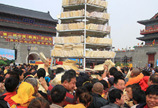The sound of silence is the height of seclusion
By Cui Jia and Lu Hongyan (China Daily) Updated: 2012-03-29 09:35Attaining wisdom
Historically, the hermitic tradition has been one of the most important aspects of Chinese society. People almost always think of hermits as outcasts, because they want to step out of society and have nothing to do with it, according to Li Jiwu, a researcher in religious studies at the Shaanxi Academy of Social Sciences. "Chinese hermits have always sought to attain wisdom with which they can help to guide society."
Li, who has been studying the mountain's hermit culture for five years, believes these reclusive people perform vital work on behalf of the society they've shunned, both by setting an example to others and by passing on the wisdom they've acquired. "Although these people live far away from modern society, they are actually helping it. They're like a mountain stream that brings fresh water down into the town - the water eventually reaches it one way or another," he said.
Estimates vary on the number of people in residence, but Li said there are currently about 1,000 hermits living on Zhongnan. Over the past few years he has seen a significant increase in the number of people adopting the lifestyle. "Society puts too much pressure on people," he said.
"Some of us recite sutras all day, while others meditate. Sometimes it could be a combination of everything," said Zhi. "It doesn't matter what we do as long as it helps us find inner peace and the true self, which is really easy to lose, but hard to find again in the city."
The very nature of their calling means that by definition hermits don't like to be disturbed, that's why they live in areas that are difficult to reach. It took an hour of hiking on narrow ice-covered paths to get to where Zhi lives, even though it is relatively close to the entry point for the mountain.
"We don't open our door to visitors who are just curious," said Zhi, pointing to a sign hanging on the door that reads, "Meditating. Please don't disturb."
"Zhongnan's hermits don't knock when visiting each other. Instead, we call out 'Amita Buddha', which is one of our secret codes," Zhi said.
|
Xiao Wang, a lay practitioner, prepares dinner for people living in the courtyard. The practitioners usually have only one meal a day. |
- Seven villagers murdered in N China
- China steps up tobacco control efforts
- Five jailed for separatism in Xinjiang
- Letter asks for leniency in poisoning case
- Antibiotics in surface water pose 'indirect health risk'
- Tianjin airport opens up transit link to Beijing
- High levels of antibiotics in China's major rivers
- China to dig tunnel for Asian rail system
- Bering strait line to US possible, experts say
- China: Stop oil rig harassment







